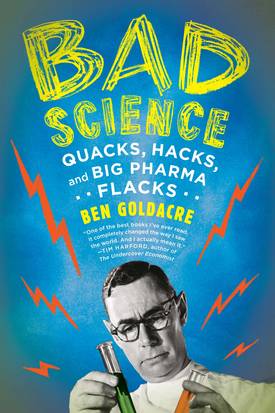
I reviewed parts of "Bad Science" in an earlier post.
Having now finished the book, I highly recommend it. An excellent book for the novice scientist to understand research issues. The focus on health issues makes the content relevant and easy to follow, and the choice of health is easy to justify - high dollars put into research by companies (=potential biased results) lots of public interest (= preliminary release of results and broad reporting without scientific scrutiny). Nutritionists take the biggest hit, along with the anti-vaccination folks (anybody in the anti-vaccine camp should read the book - the rumour mongering ab out the anti-polio vaccine in Africa caused areas to avoid the vaccine, which caused a very predictable and tragic increase in cases, clearly an outcome significantly out of alignment with the "anti-drug company" fears of the rumour mongers).
Goldacre's position as a critic of research methodology puts him in a good position to assess the rumour-mongering on one side, and the advertising campaigns on the other. I think he runs a very nice line between them, acknowledging that there is a reason to worry about the research coming out of company-funded labs, but at the same time focusing on the actual clinical outcomes, not the "feared" or "promised" outcomes.
Goldacre does a good job of explaining how research can be perverted and how statistics can be manipulated, both discussions well done, and both with clear examples, and neither requiring a degree in statistics to understand.
Again, a highly recommended book for folks looking for an ancillary text or realistic examples to support a research methodology class or a statistics course.
I"d also make this a mandatory read for any knee-jerk science non-believers, as it showcases nicely the differences between science (as an empirical data-driven enterprise) and more political fields dominated by leaders. In fact, this is one of the key criticisms of news reporting of science - they tend to rely on "experts" which gives the illusion that there is a natural leadership hierarchy in science.
The "truth" about science is that anybody can knock down a Stephen Hawking or an Albert Einstein with a well designed experiment that directly conflicts with their hypotheses, no public opinion or election required. Books on Einstein focus on his later years where he was diverging from the mainstream of physics, a field where he made many of the key discoveries his contemporaries were using as a base platform.
Goldacre provides lots of evidence for the misuse and misunderstanding of science, and points fingers in appropriate directions. He's not campaigning for any particular changes, other than a better educated public in science, so the "power" of sensational media reports or the fear-mongering of small groups can be assessed for their merits, not the degree of attention they generate. Who can argue against better understanding, other than those profiting form ignorance?
No comments:
Post a Comment